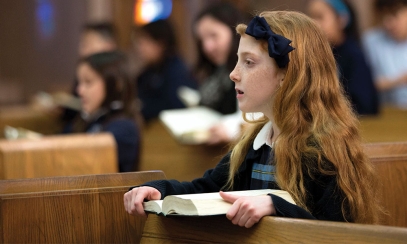
Helping hesitant kids go to confession
There are some activities our kids don’t have trouble doing, like eating treats and playing. Then there are those that are really important but aren’t necessarily approached with the same enthusiasm and ease, such as doing chores or eating vegetables. As parents we encourage, persuade and insist because some things just have to be done. What about going to confession? This article offers some tips for helping kids receive the sacrament of reconciliation, which is essential to our sainthood but can fall into the category of things kids aren’t fond of doing and can be a tough go for lots of reasons.
There are some activities our kids don’t have trouble doing, like eating treats and playing. Then there are those that are really important but aren’t necessarily approached with the same enthusiasm and ease, such as doing chores or eating vegetables. As parents we encourage, persuade and insist because some things just have to be done. What about going to confession? This article offers some tips for helping kids receive the sacrament of reconciliation, which is essential to our sainthood but can fall into the category of things kids aren’t fond of doing and can be a tough go for lots of reasons.
The truth
This sacrament is the mercy of Jesus in action. It’s a gift to us, not a penalty to replace the words guilt, shame, bad and embarrassed with words such as forgiven, mercy, freedom and peace. The confessional isn’t a penalty box but rather a place to be made shiny, new and stronger from the inside out.
Purpose
If our body is sick we go to a doctor and talk about what’s going on so we can be made well. Help kids understand that our actions and words can hurt Jesus, ourselves and others, and leave our heart and soul in need of healing. Confession is the place we go to tell Jesus, through the priest, what’s going on so we can be made well and receive the grace to avoid the same sins again. Jesus knew we’d need this again and again, which is why he gave us the gift of this sacrament to keep us close and help us get to heaven. If we know the “why,” it’s easier to put the “how” in motion.
The root
If your child resists the thought of going to confession, have a conversation about why … what worries them or bugs them about it.
The practical
Let them check out the confessional when the church is empty. Do a practice run (without the sins) so they know where to walk, sit or kneel. It’s OK to have them walk in with the steps written down on a piece of paper. A common fear among kids is that they’ll forget what to say or how to say it, so you can help them be prepared. As you practice/role play a confession, switch roles and let the child be the priest to help them understand all the words and events of the sacrament. Find an age-appropriate examination of conscience to help them pray, ponder and prepare.
Parents first
If your child is nervous, hop in line ahead of them and when you are finished, tell the priest there is a nervous little one coming up behind you who might need a little TLC through the process.
Divine amnesia
A priest once told my class that one of his favorite graces as a priest is the grace of divine amnesia, which means he forgets everything he hears during confessions. It’s typical for kids not to want to disappoint, so knowing the priest has heard everything, and he will not remember nor is he ever allowed to share anything he hears in the confessional, can put their mind at ease. His job is not to judge us … his job is to bring God’s forgiveness and mercy. In persona Christi means the priest is acting “in the person of Christ.”
Go, and go again
We know, as Catholic parents, that our job is to raise great humans who put Jesus at the center of their lives. In order to ensure that we are up to the task of raising saints, we must model the behavior we know to be right and true. The best way to help our children become comfortable and even joyful about confession is to go, and go regularly. We schedule dozens of things on the family calendar, and going to confession must appear there too.
Jesus is waiting in the sacrament of reconciliation and he has only the very best gifts to give your children there.
Sheri Wohlfert is a Catholic school teacher, speaker, writer and founder of Joyful Words Ministries. Sheri blogs at www.joyfulwords.org.



